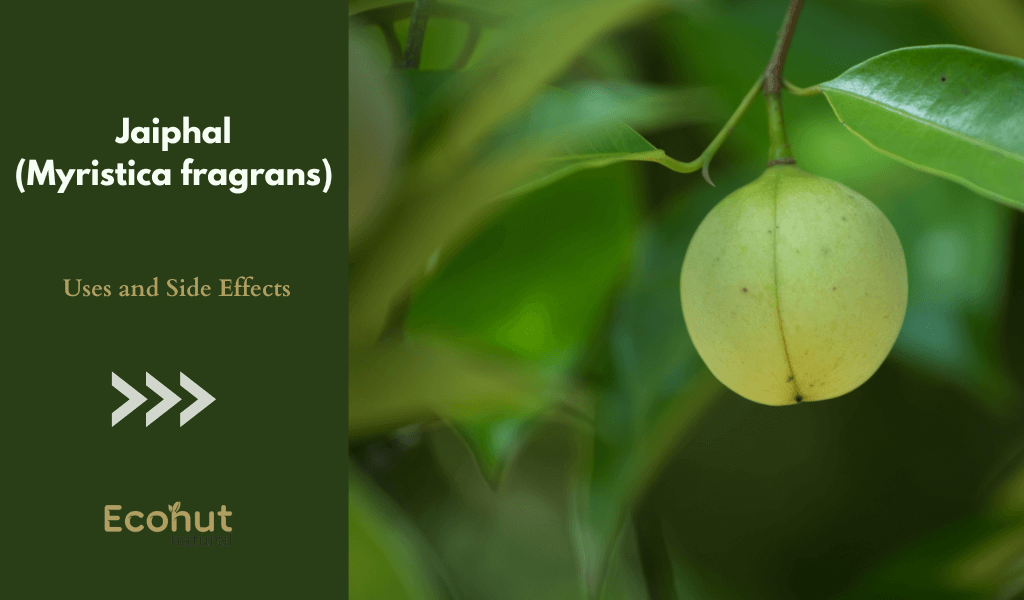Jatiphala, also refered as Jaiphal, refers to the nutmeg tree, scientifically called Myristica fragrans. It’s native to Indonesia and is famous for two spices derived from it: nutmeg and mace.
Nutmeg is the seed of the tree, while mace is the reddish aril covering the seed. Both spices have been used for centuries in cooking, perfumery, and traditional medicine due to their aromatic and medicinal properties.
Nutmeg is often used in baking, cooking, and brewing, while mace is used in spice blends and savory dishes. Additionally, both nutmeg and mace are believed to have various health benefits, although their use should be moderate due to their potency.
Jaiphal (Myristica fragrans) Discription
Jaiphal, also known as nutmeg, is an evergreen tree native to the Spice Islands of Indonesia. It belongs to the genus Myristica and is prized for both its culinary and medicinal properties. Here’s We are Discuss Jaiphal plant Discription.
Botanical Description:
The Jaiphal tree can grow up to 20 meters tall and has dense foliage. Its leaves are dark green, glossy, and elliptical in shape, arranged alternately on the branches.
Flowers:
The Jaiphal tree produces small, bell-shaped, pale yellow flowers that grow in clusters. These flowers are often fragrant and contribute to the overall aromatic profile of the plant.
Farming:
Jaiphal trees prefer tropical and climates with rich. They flourish in warm, humid conditions and are often planted in regions with high rainfall. The trees require regular watering and partial shade when young but can tolerate full sun once established.
Fruits:
The fruit of the Jaiphal tree is the source of both nutmeg and mace. The fruit is similar in appearance to a small peach or apricot and has a fleshy, yellow exterior. When ripe, the fruit splits open to reveal a single seed surrounded by a bright red, net-like covering called the aril, which is known as mace. Inside the seed is the nutmeg kernel, which is the spice commonly used in cooking.
Jaiphal Scientific Classification
| Kingdom | Plantae |
| Subkingdom | Tracheobionta |
| Superdivision | Spermatophyta |
| Division | Magnoliophyta |
| Class | Magnoliophyta |
| Subclass | Magnoliidae |
| Order | Magnoliales |
| Family | Myristicaceae |
| Genus | Myristica |
| Species | Fragrans |
Other Name of Jaiphal
Hindi Name: Jaiphal
Telugu Name: Jaji Kaya
Tamil Name: Jatikkai, Sathiccupi, Jadhikai, Jadhiccupi.
Bengali Name: Jaiphal & Javitri
Kannada Name: Jaikai
Sanskrit Name: Jatiphala, Jatiphalam, Jatikosha, Jatipatri, Jatipatra, Jaiphal, Jayapatri, Javitri
English Name: Nutmeg
Punjabi Name: Jaiphal
Urdu Name: Jauzbuwa, Jaiphal
Assamese Name: Jaiphal, Kanivish
Malayalam Name: Jathikai
Marathi and Gujarati Name: Jaiphal
Arabic Name: Jeeyansibea
Ayurvedic Properties
Hindi / Sanskrit
- Rasa, Tikta, Katu
- Guna, Laghu, Teekshna
- Virya, Ushna
- Vipaka, Katu
English
- Taste, Bitter, Pungent
- Physical Property, Light, Strong
- Potency, Hot
- Metabolic Property (After Digestion), Pungent
Also Read: Talisa Patra (Abies Webbiana): Uses, Benefits and Side Effects
Benefites and Uses of Jaiphal (Myristica fragrans)
Jaiphal, also known as nutmeg, is a popular spice used in various culinary dishes and traditional medicines. Here, We are discuss some of benefits regarding Jaiphal:
Useful Improve Sleep:
Jaiphal is sometimes used as a natural sleep aid. It contains a compound called myristicin, which may have sedative effects and promote relaxation, aiding in better sleep quality.
For Brain Health:
Medical Science suggest that Jaiphal may vontain neuroprotective properties and could potentially enhance cognitive function. However, more research is needed in this area.
For Mouth Health:
Due to its antibacterial properties, Jaiphal is sometimes used in oral care products. It may help in combating oral bacteria and reducing bad breath.
Useful Blood Serculation:
Some research suggests that Jaiphal may help in regulating blood pressure levels. However, more studies are required to confirm its effectiveness and safety in this regard.
Helpful In Digestive System:
The medical sicence has benn find elements in Jaiphal to aid digestion by promoting the secretion of digestive enzymes. It may help relieve indigestion, bloating, and flatulence.
Pain Relief Herb:
In traditional medicine, this herb is used as a natural remedy for pain relief. It may help alleviate muscle pain, joint pain, and toothaches.
Contain Antioxidant Properties:
Nutmeg contains antioxidants like phenolic compounds and essential oils, which may help in combating oxidative stress and reducing the risk of chronic diseases.
Includes Anti-inflammatory Elements:
Nutmeg contains compounds that exhibit anti-inflammatory properties, which may help in reducing inflammation and associated symptoms in conditions like arthritis.
Side Effects of Jaiphal (Myristica fragrans)
Jaiphal, also refered as nutmeg, is a common spice used in cooking and traditional medicine. While it has several potential health benefits, consuming large amounts of nutmeg or its essential oil can lead to adverse effects. Here, We discuss some side effects regarding nutmeg:
Dry mouth and thirst:
Nutmeg consumption may lead to dry mouth and increased thirst.
Agitation and anxiety:
In some cases, nutmeg consumption can cause feelings of agitation and anxiety.
Hypotension (low blood pressure):
Nutmeg may cause a drop in blood pressure, which can lead to symptoms such as dizziness and fainting.
Increase heartbeat:
Some individual may experience an increase in heart rate after eat nutmeg. This can be particularly concerning for individuals with heart conditions.
Long term use Liver toxicity:
Consuming very large amounts of nutmeg over a prolonged period may potentially lead to liver toxicity. However, this is rare and typically only occurs with extremely high doses.
Hallucinations and delirium:
One of the most well-known side effects of nutmeg consumption is its psychoactive effects. In large doses, nutmeg can cause hallucinations, confusion, and delirium. This is due to a compound called myristicin, which can act as a central nervous system depressant and hallucinogen.
Dizziness and disorientation:
Nutmeg can cause dizziness and disorientation, particularly when consumed in large quantities.
Nausea and vomiting:
Ingesting a large amount of nutmeg can cause nausea and vomiting. This is because nutmeg contains compounds that can irritate the stomach lining.
Conclusion
Jaiphal, or Myristica fragrans, renowned for its aromatic and medicinal properties, Boasts a rich history of traditional use in culinary and therapeutic practices, Its active compounds offer potential benefits ranging from digestion aid to mood enhancement, moderation is key, as excessive consumption may lead to adverse effects.
FAQS
Are there any health benefits to consuming jaiphal?
Jaiphal contains various compounds that may have health benefits, including antioxidants and anti-inflammatory properties. It has been used in traditional medicine to aid digestion, relieve pain, and improve sleep. However, it should be consumed in moderation as large amounts can be toxic.
Are there any safety considerations when using jaiphal?
Jaiphal contains compounds that can be toxic in large doses, so it should be used in moderation. Pregnant women should avoid consuming large amounts of jaiphal, as it may cause uterine contractions.

